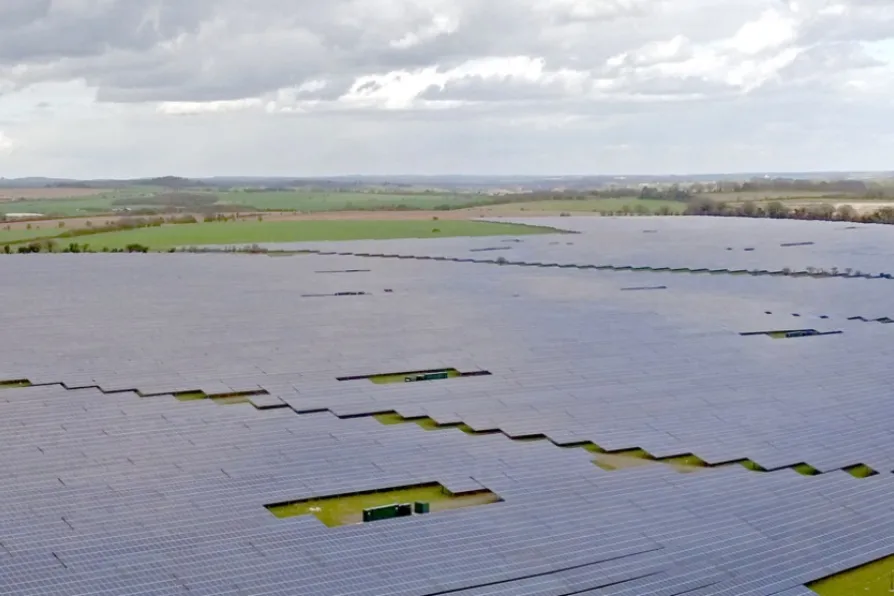Durham Miners’ Association general secretary ALAN MARDGHUM speaks to Ben Chacko ahead of Gala Day 2025

 An aerial view of a solar farm in Hampshire
An aerial view of a solar farm in Hampshire
In Britain today we all take electricity pretty much for granted. Many places in the world still don’t have the luxury of instant light and heat at the flick of a switch.
A century ago, Lenin said of his native Russia: “Communism is Soviet power plus the electrification of the whole country,” showing how important he thought electricity was.
We seem to have two issues around electricity supply in Britain. One is the endless Tory free market nonsense that suggests, if we all swap our supplier every few months, the privtised industry will become more efficient and prices will drop like a stone. Excuse me while I laugh.
The other far more serious issue is the long effects on our environment from the various methods we use to generate our electricity.
Those electric car enthusiasts who talk glibly about emission-free motoring often seem to forget that the power they use to recharge their batteries has to be generated somehow.
I remember being told 50 years ago that nuclear power would provide power so cheaply there would be no need for meters. Now after Chernobyl, Three Mile Island, Fukushima and even the Seascale disaster — another British first — to colour our opinions, I and many of my generation want nothing to do with nuclear power.
Apart from the dangers, nuclear power has another major disadvantage. It isn’t easy to vary the output to match demand quickly — it still contributed around 25 per cent to Britain’s power consumption in the 1990s and is down to nearer 20 per cent today.
My very environmentally aware granddaughter Lizzie is far less sceptical about nuclear than I am and believes nuclear power must play a part in our future.
On April 16 this year, the British electricity generating industry started its longest period ever of providing the nation’s entire electricity needs without burning any coal at all.
The new record period would last for over two full days at 54 hours and 50 minutes.
This follows another record on February 24 when the strong icy winds that brought snowy chaos and 17 deaths to Britain and earned the nickname the Beast from the East saw wind power, both off and onshore, making the largest single contribution to generating power, bigger than coal, gas, nuclear and all other sources.
We know that many Tory MP’s have demonstrated classic nimbyism — “not in my pretty and middle class backyard thank you very much” — and opposed the development of wind farms in their constituencies.
Labour has accused Theresa May and her government of trying to stifle renewable energy developments. They certainly have tried.
In 2016, the Tories reduced the payments for the home-generated electricity schemes that had encouraged so many home owners and housing associations to fit solar panels.
Labour warns now that the government is holding back low carbon energy projects by allowing power distribution networks to impose new charges on sustainable energy developers.
Two of Britain’s largest power networks have introduced charges to renewable energy suppliers just for the estimates for grid connection by solar and wind farm developments.
Previously the estimates were provided free, but new government rules mean that companies are now likely to be charged between £2,500 and £10,000 just for the estimates.
Labour’s shadow business secretary Rebecca Long-Bailey MP told us: “Recent reforms allowed for these outrageous financial demands to be made, which will have serious repercussions right across the renewable sector and for the future of clean energy.”
It was, of course, Margaret Thatcher and her particular nasty gang of Tory MPs, lords and supporters and their anti-trades union policies that destroyed the British coal mining industry that had supplied most of our powers stations for decades.
Make no mistake, cleaner power stations didn’t even figure in their thinking.
Coal still makes a huge contribution to our electricity generating industry and, although it is undoubtedly a dirty fuel, modern technologies have made it much less polluting that it once was.
We should remember that, without coal, we would not be able to live as we do today. “King Coal” was the foundation of the second industrial revolution. We had decimated our forests burning wood in the first.
Coal, steel and railways were the holy trinity that bought progress, technology and industry.
They built modern Britain, bringing militant trades unionism too.
It was in our coal pits that British socialism was conceived, born and nurtured, just as in the coal pits around Calais the seeds of the French resistance to Hitler and his nazi occupiers were sown.
No wonder Thatcher hated the coal miners of Britain and the international socialist solidarity they stood for.
Energy from renewable sources has been steadily increasing since 2000 as a result of national and international incentives, including the EU renewable energy directive that requires the EU as a whole to achieve 20 per cent of its energy from renewable sources by 2020.
Britain’s lower target is set at 15 per cent and to achieve this it has a varied mix of renewable technologies including biomass which is a key fuel source in both electricity generation and direct heat generation.
Wind, solar photovoltaics, hydro, wave and tidal also contribute to electricity generation and active solar, heat pumps and deep geothermal are used in heat generation.
Although solar photovoltaics was the leading technology in 2016, producing 30 per cent of total capacity, in electricity generation terms, bioenergy accounted for the largest proportion (36 per cent) followed by onshore wind (25 per cent) and offshore wind (20 per cent).
In 2016, the last year for which accurate figures are available, renewable electricity represented 25 per cent of total electricity generation. Britain has now exceeded its third interim target.
This was despite the fact that wind speeds in 2016 were lower than in 2015, which had been the highest in 15 years. We had many more wind farms but less wind.
Rainfall was also much less in 2016 than in 2015 — a record wet year — leading to a 14 per cent fall in hydro-electric generation.
This highlights the issue that sustainable energy will always be somewhat weather-dependent. The other major challenge is to develop efficient storage systems for saving electricity generated when the sun shines or the wind blows rather than when we want to use it. That is a story for another feature,
So what should we do — nuclear, solar, wind, tide or should we stick with fossil fuels, even a cleaner “King Coal” at least for a while?
Whatever way we choose to go the most important thing, as always, is that we consider the wider results for the way we all live rather than just going for the biggest profits for the self-selected few.



















